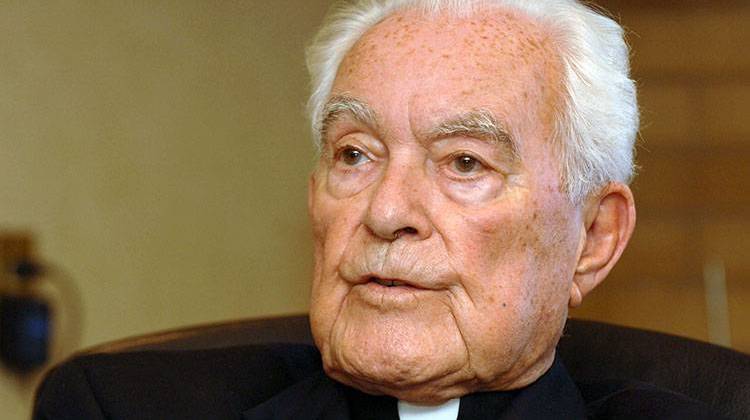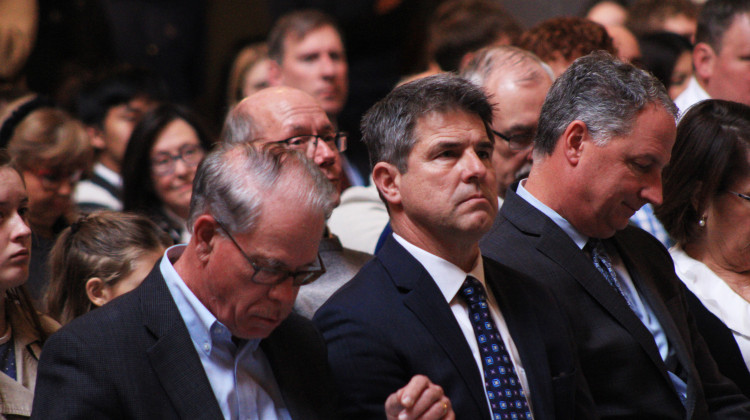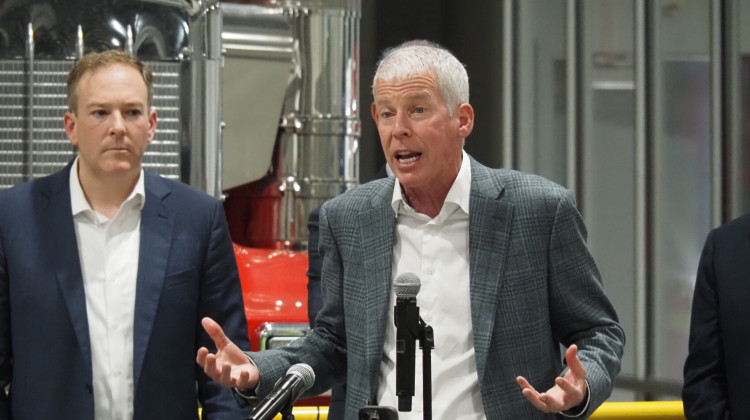
The Rev. Theodore Hesburgh, C.S.C, president emeritus of the University of Notre Dame, died Thursday night Feb. 26, 2015 at age 97 according to University spokesman Paul Browne.
AP Photo/Joe Raymond, FileThe Rev. Theodore Hesburgh, a former president of the University of Notre Dame who tangled with the Nixon administration, died late Thursday. He was 97.
For those who knew him, Hesburgh was simply Father Ted. But make no mistake, he was a highly influential priest who moved among presidents and popes. During his 35 years as president of Notre Dome, he reinforced the importance of a college education, and urged that it be affordable and accessible to all.
"He understood that ... higher education was at the pivot point in American life, it was the place that both provided individuals with the opportunity to climb a ladder of opportunity ... and be successful," says David Warren, the president of the National Association of Independent Colleges and Universities. He adds that Hesburgh was "the single most influential figure in American higher education in the 20th century."
Hesburgh was born in Syracuse, New York, in 1917, and took his vows when he was 26. The New York Times says he was raised in a religious home and wanted to be a priest from the time he was 6. Although he wanted to serve as a chaplain on an aircraft carrier during World War II, he was assigned to Notre Dame to help train naval officers. He stayed at the university and became its president in 1952.
The Rev. John Jenkins, the current president, tells NPR that during his tenure, Hesburgh "took Notre Dame from being a rather small Catholic mid-western institution to being an ... academically distinguished institution."
Reuters says Hesburgh increased the school's annual operating budget 18-fold to $176.6 million dollars, and nearly doubled its enrollment. In 1972, Notre Dame admitted female students for the first time. Hesburgh later wrote that "Our women students brought a good measure of gentility" to Notre Dame.
Hesburgh was just as active outside the university. The New York Times says he held more than a dozen White House appointments under six presidents. During his tenure, Hesburgh also became a champion of nuclear disarmament and civil rights.
He clashed with President Richard Nixon over enforcing the nation's civil rights laws, and was ultimately forced off the United States Civil Rights Commission in 1972.
Jenkins says Hesburgh was driven by a moral vision.
"It's important to remember, this is the 60s; it was not universally acclaimed ... for a Catholic priest to be advocating for civil rights for African Americans. It was the middle of the cold war; it was not universally accepted to argue for nuclear disarmament," says Jenkins. "He was a courageous leader for this time, and for that reason a highly influential one."
But Hesburgh also ruffled the feathers of the Catholic church, pushing back when the church wanted to impose more control over its universities, making religion more important than education, says Warren.
"He was not rejecting Catholicism. He was saying faith and reason can be side by side, and that's part of what a first-rate education and life are all about, holding those two together," he says.
Hesburgh was given many honors in his time. According to the Associated Press, Hesburgh received 150 honorary degrees. He was awarded the Congressional Gold Medal in 2000. In 1962, he appeared on the cover of Time magazine which ran an article describing him as the most influential figure in the reshaping of Catholic education.
9(MDEwMDc1MzM3MDEzNDczOTA0MDc1MzViMQ001))
 DONATE
DONATE






 View More Articles
View More Articles

 Support WFYI. We can't do it without you.
Support WFYI. We can't do it without you.